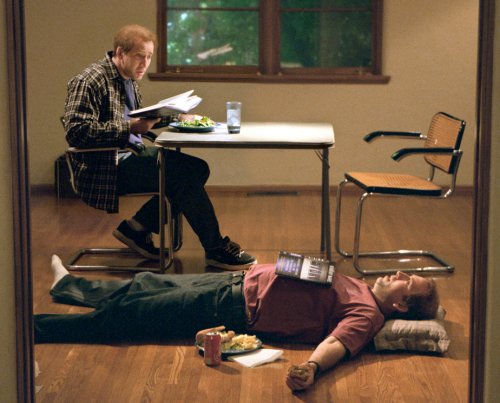Remember the bad old days of music on VHS, when most videoed concerts ran for a standard TV-show length of 45 minutes? If you were lucky, a premier band released 75 minutes worth, but that was rare. Canadian trio Rush always provided far better value for money than most of their rivals (not that I think they have any equals). Their previous live video, the remarkable A Show Of Hands (1988), filmed over two nights at Birmingham’s NEC, plays for 90 minutes.
This is the first DVD from Rush and, despite various production difficulties including the band’s lack of prep time for a pro sound-check, it’s an amazing film. Shot with 22 cameras in Rio de Janeiro’s Maracana Stadium, this venue sees Rush performing for a 40,000-strong audience on 23rd November 2002.
 |
| Neil Peart - the Professor |
Starting with Tom Sawyer, the band recycles other 1980s’ tracks such as New World Man, before launching into new material like Earthshine. Unlike many progressive-rock bands, Rush play artfully composed instrumentals - including their momentous YYZ - without any danger of appearing self-indulgent, because such works maintain their commitment to creativity and musicianship. The Pass is introduced as one of the band’s own favourites, and it’s followed by Big Money and The Trees, with lyrics that comment on capitalism and politics. Closer To The Heart was a late addition to this tour’s set-list, especially for the Brazilian audiences, because Rush discovered it was the most popular of their songs, down south. The often-neglected Natural Science precedes a brief intermission, but the band return to the stage in spectacular fashion with a cartoon dragon on the main projection screen, perfectly synchronised to physical fire effects to mark the beginning of One Little Victory.
The second half of the show continues with more songs from the latest album, and their live versions of Ghost Rider and Secret Touch are even more energetic than the studio tracks. Dreamline and the brooding Red Sector ‘A’ segue into the main instrumental section of the show, which includes Neil Peart’s awesome solo O Baterista, an impressive piece that aims to present a narrative of drumming and drums. Rush have pointedly ignored rock stars’ vogue for ‘unplugged’ versions of their songs, but here we find Geddy Lee and Alex Lifeson sitting down with acoustic guitars for a folksy arrangement of protest-song Resist, which does at least give Peart a break from the circular array of his revolving drum kit.
 |
| Geddy Lee |
It’s mostly older material from then on, with the powerhouse ‘Overture’ from 2112, a livewire rendition of The Spirit Of Radio (still, I think, Rush’s most successful 45-rpm single), a medley of By-Tor And The Snowdog with Cygnus X-1 (only the intro), in an encore that closes with Working Man - a track from their very first album.
 |
| Alex Lifeson |
At nearly three hours, RUSH IN RIO (2003) offers magnificent entertainment, complete with Peart’s frankly staggering variety of percussive beats, Lifeson’s hilarious warbling rant about jazz, and there’s also Lee’s unusual stage-decor of laundry machines. If your musical tastes include anything by Led Zeppelin, Rush are regarded as leaders of the next generation of innovative rock acts. Diehard fans will not be disappointed.
An extras disc features Andrew MacNaughton’s excellent documentary The Boys In Brazil (54 minutes), which details the planning and execution of Rush’s first ever visit to Brazil for the tour’s last three dates (all stadium shows) with the 60,000 crowd in San Paulo being the largest audience Rush have ever played to as a headline act.



















































